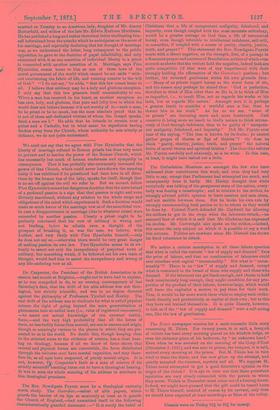The Rev. Newdigate Poyntz must be a theological curiosity worth
study. The Guardian,—safest of able papers, which guards the barrier of its lips as anxiously at least as it guards the Church of England,—had committed itself to the following
characteristically guarded statement It is surely the belief of
Christians that a life of unrepentant malignity, falsehood, and impurity, even though coupled with the most accurate orthodoxy, would be a greater outrage on God than a life of unrecanted heresy, even though referable to intellectual indolence, self-will, or cowardice, if coupled with a course of purity, charity, justice, truth, and prayer?" This statement the Rev. Newdigate Poyntz meets with a direct negative, on the strength, first, of a passage in a Romanist prayer and a sermon of Bourdalone, neither of which even somuch as shows that the writers held the negative, indeed both are quite compatible (if that were of any importance) with their strongly holding the affirmative of the Guardian's position ; but further, the reverend gentleman states his own grounds thus : —" Many of us priests regard heresy as the worst form of sin, and the reason may perhaps be stated thus : God is perfection, therefore to think of Him other than as He is, is to think of Him as imperfect, i.e., to insult Him, not as regards his works or his laws, but as regards His nature.' Amongst men it is perhaps a greater insult to consider a truthful man a liar, than to thwart him in his work." As far as we see, "some of us priests" are becoming more and more heathenish. Just conceive it being more an insult to God's nature to think errone- ously of God through indolence, than to be guilty of "unrepent- ant malignity, falsehood, and impurity." Did Mr. Poyntz ever hear of the saying, "The tree is known by its fruits ; ye cannot gather grapes of thorns or figs of thistles "? Or does he think "purity, charity, justice, truth, and prayer" the natural fruits of moral thorns and spiritual thistles ? The Guardian refutes Mr. Poyntz carefully and anxiously, as is its wont. In this case, at least, it might have lashed out a little.


































 Previous page
Previous page